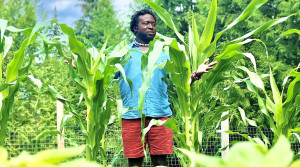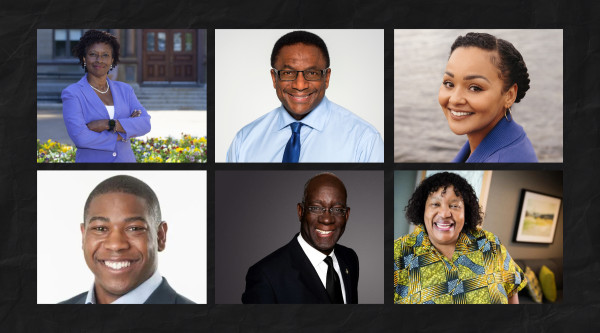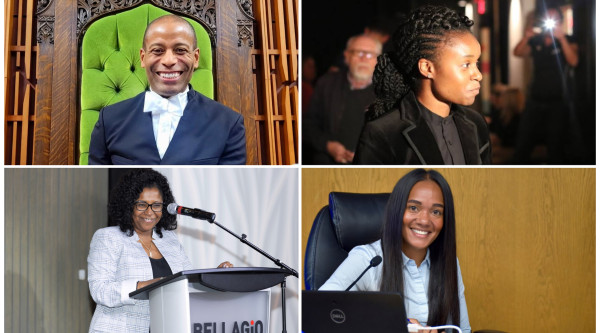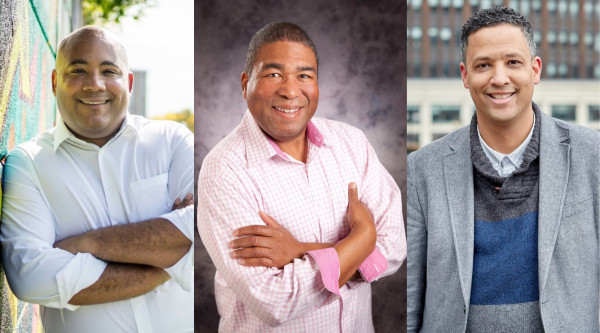Liberals Emmanuel Dubourg and former Minister for Women, Gender Equality and Youth, Marci Ien, aren’t seeking re-election.
Ien described the last few months of her time in government as “satisfying yet bittersweet” as she wrapped up her ministerial duties and said goodbye to the people she’s worked with for almost 5 years. Ien expressed her appreciation for Justin Trudeau’s role in her transition from journalist to politician.
“I don't think anybody would have come to get me the way he did. He saw me as someone who could lead in a different way and frankly, I didn't see that in myself,” Ien recalled.
Ien said it took several phone calls with members of the party and months of contemplation before she decided to run for office.
“I don't want to be a politician, I interview them,” she told Trudeau’s former chief of staff Katie Telford. “This is not anything I ever hoped to be.”
According to a first-of-its-kind study conducted by Carleton University in partnership with Operation Black Vote Canada, Black on the Ballot, Ien’s experience of needing to be convinced to run for office is common among Black people.
The study examines what running for and serving in elected office is like using archival research, a national survey, and in-depth interviews with Black candidates and legislators to get details about their experiences.
The study also lists recommendations to encourage more Black people to seek elected office, including adopting a multi-pronged recruitment strategy and providing accessible candidate training, especially at the local level.
{https://www.instagram.com/p/DDhzaquSqPW/}
The good, the bad and the ugly
"When I stood up in the House for the first time to speak, just to thank people for voting for me, the other side, the Conservatives, they started shouting. And I realized they were shouting “token” at me. And I thought wow okay, I see exactly who you are. And I mean, that was just day one," says Ien.
"Every day you walk into Centre Block and you don’t really see yourself at all. That’s tough. And then you realize you have a responsibility to represent people who aren’t usually seen and heard. That’s a constant struggle. But I felt so supported by the prime minister and by the party as a whole, and that’s important."
Despite her initial reservation, Ien called her time in politics “the honour of my life” and even reflected positively on her NDP and Conservative critics, Leah Gazan and Karen Vecchio. “I had all of my critics on speed dial. I am not kidding, we did so much work together. With Women And Gender Equality, there’s no partisanship. You reach across party lines, racial lines, whatever it is, just to get the work done, because that’s why we’re here,” said Ien.
Erin Tolley is a political science professor at Carleton University and the Canada Research Chair in Gender, Race, and Inclusive Politics. She says that unfortunately, Ien’s positive narrative about her political career isn’t the norm for Black politicians.
“Much of what we hear about Black Canadians in politics is stories about the negativity that they face, stories of their departures from politics, stories about hostility and discrimination,” says Tolley.
The Black On The Ballot Study reveals “the good, the bad and the ugly” of running for public office. For example, one of the report’s key findings was that the majority of Black Canadians experienced discrimination while running for or serving in office, including from other politicians, political staffers, and media.
Former Green Party Leader Annamie Paul called her time as leader “the worst period of her life.” And former Liberal MP Celina Caesar-Chavannes had a very public falling out with Prime Minister Justin Trudeau.
Balarama “Steven” Holness is a politician and former professional football player. He received death threats when he ran for mayor of Montreal in 2012. Holness told Black on the Ballot podcast host Nana aba Duncan that the targeting took a toll on him and made him feel “extremely vulnerable.”
{https://www.youtube.com/watch?v=-Nb2KXPQBe8}
“As a politician, you will be exposed in so many different ways from your family life to your professional life, to your personal life. You are going to be exposed to the world. Exposed to scrutiny. And if you have thin skin, you will crumble. You will not survive,” said Holness.
Former Deputy Premier of Alberta, Kelechi “Kaycee” Madu became the first Black person in Canada to serve as a provincial minister of justice in 2020. He was shuffled from his cabinet position after a 'scandal' where he called Edmonton’s police chief after receiving a traffic ticket. Madu says he called the chief to express his concern about being unfairly targeted, especially as he was advocating for policies against carding and racial profiling.
A probe by the Law Society of Alberta found that Madu didn’t do anything wrong, but the call created a "reasonable perception of interference.”
Madu revealed that the negative attention he received also impacted his family. He called the situation “unbearable” but says it's one he and other Black politicians experience.
“It doesn't matter the political environment, the philosophy of that particular community or environment, it is a price that all of us as Black people must pay for daring into public life,” Madu told Duncan.
Former Nova Scotia MLA Angela Simmonds had her family dragged into a negative experience on the campaign trail. While her young daughter was canvassing with Simmonds’ campaign manager, someone said, “Why would I vote for your mom? She's Black. No Black people are here. Why was your mom even running? You Black people think you deserve things.”
The incident left Simmonds incensed and her daughter in tears.
Despite negative anecdotes, the Black On The Ballot study found that many Black Canadians had successful political careers, made contributions, and described the experience as fulfilling. In fact, 87% of respondents said they would do it all again. Tolley pointed out that many respondents said they’d recommend a career in politics to others, and she says that willingness is an important fact among the findings.
“They continue to want to provide a voice for people who've traditionally been underrepresented in politics and to solve some of the pressing policy problems that face us.”
Other key findings from the report include:
- Black Canadians are most likely to first run for office at the local level
- Raising money and finding volunteers are the most commonly cited challenges to elected office
- Black women are less likely than Black men to consider running for office unless someone else encourages them
Another challenge the report identified is the lack of uniformity in running and serving in those institutions. For example, becoming a candidate involves a different process at the municipal level than the federal level, and there are different requirements for different parties.
For example, candidates had to pay $350,000 to be eligible to run in the Liberal leadership race Mark Carney won in March. However, the fee was “just” $75,000 when Trudeau ran in 2012. Pierre Poilievre paid $250,000 for his successful bid to become the Conservative Party leader in 2022. Meanwhile, former MP Peter McKay racked up $1.7M in debt for an unsuccessful leadership bid, which took him years to repay.
To make matters worse, parties provide little information about whether or not any portion of their fees is refundable, what the fees are used for, or why they’re increased. ByBlacks attempted to get clarification on registration fees but didn’t get a response.
Hostile politics
Even when Black candidates jump through all the hoops, they face additional challenges once they get into office.
“A lot of that effort to get more diverse candidate slates is squandered if, once those candidates make it to elected office, they find those spaces hostile. They find those spaces are not open to their perspective,” says Tolley.
Respondents said negative experiences like being dismissed or discriminated against made being in political spaces “a drain on their mental health” and in some cases dangerous for themselves or their families.
According to Parliament records, there was a drastic increase in incidents of MPs being harassed and threatened online and in person, rising from 8 cases in 2019 to 530 in 2023. Fellow parliamentarians are partially to blame for the prevalence of bad behaviour.
There are guidelines about matters like sexual harassment and violence, but there isn’t a code of conduct for non-sexual harassment or civility between MPs. It’s the responsibility of people like Speaker of the House of Commons, Greg Fergus, or individual committee chairpeople to enforce the rules of engagement regarding decorum. Fergus told a committee he regularly questions whether the conduct between MPs would be acceptable “in any other workplace. I think the answer is no.”
Strong opinions and heightened emotions are regular features of politics and are arguably good things. However, unlike Fergus, who’s been engaged with politics most of his life, many Black candidates are unfamiliar with its nature. Tolley says many survey respondents were “dismayed” by the culture of politics once they entered the arena.
“[Black candidates are] often recruited from the outside and they're shocked to see the level of disrespect in politics, the level of incivility, and that also causes them to feel like it's not a place for them,” Tolley explained.
The role of the media
Some of the report’s recommendations for improving the experiences of Black people in politics are directed at the media. Tolley says news publishers can act as facilitators or gatekeepers to citizens' access to information.
“They can play a significant role in elevating the prospects of some candidates and deflating the prospects of others,” Tolley said. “The media are reflecting reality but they're also creating reality because narratives about who’s a viable candidate, who are the front runners are picked up by media consumers, and can be consequential to how they understand politics.”
Tolley calls out the negativity bias in media. “The types of stories that tend to be deemed newsworthy have elements of scandal or drama, wrongdoing or surprise. Media tend not to cover good news stories because they don’t put eyeballs on the page,” Tolley said. “It’s important to flag [negative experiences], but it can also discourage people who want to enter a space when most of what they've heard about people like them being in that space are negative experiences.”
Tolley observed that media stories about racialized candidates are substantively different than stories about white candidates for three main reasons. One, racial characteristics or descriptors tend only to appear in stories about racialized candidates, effectively framing white politicians as the default and othering racialized people. Racialized candidates are described as less electorally competitive than their white counterparts, even when they have many of the same qualifications. And racialized candidates tend to be included more frequently in stories about “minority issues” like multiculturalism, immigration and crime instead of stories about healthcare or the economy.
“The media are making choices about who they put forward as spokespeople or experts on particular issues and they tend to pigeonhole racialized candidates as experts on issues that are not electorally top of mind,” Tolley said.
In addition to the electorate being less informed than they should be, a lack of coverage negatively impacts the electoral chances of present and future Black candidates.
A striking number from the report is that more than half of Black candidates only ran once, essentially abandoning the idea of politics after the first go.
To date, there have only been 20 Black Canadians ever elected to the House of Commons of Canada. Tolley knows increasing that number will be an uphill battle. But she’s hoping this report will be an important step in solving it.
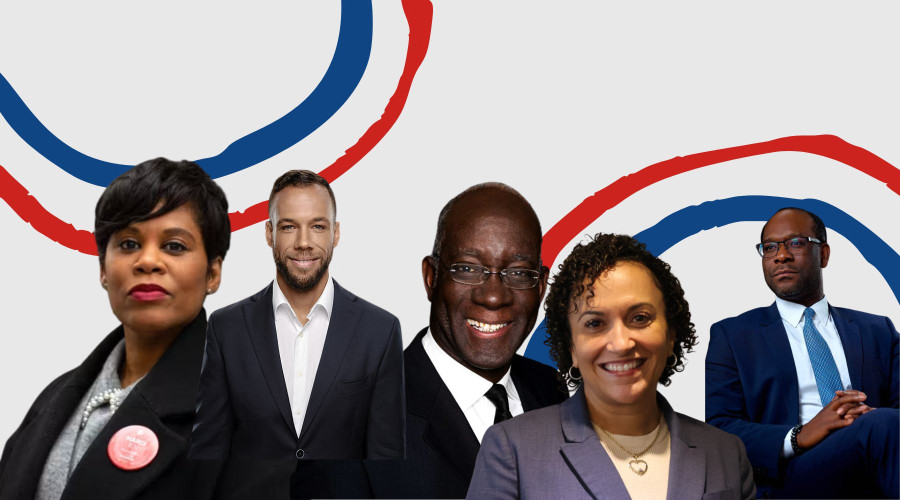
 By
By 





